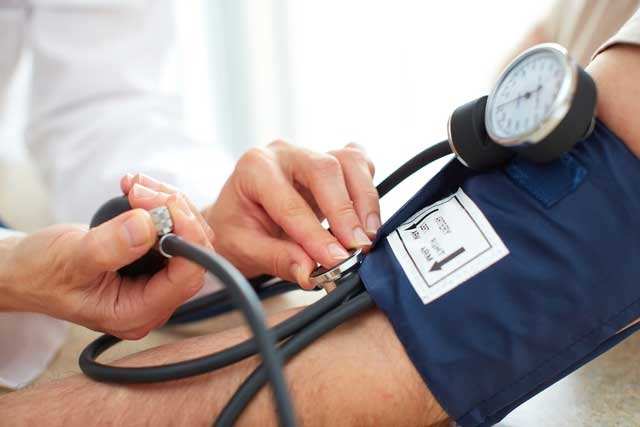
Many people wonder what to eat to help raise low blood pressure. Low Blood Pressure (also known as Hypotension) is typically considered to be a blood pressure reading under 90/60 mm Hg. This condition affects many people, particularly as they grow older. Between 10% and 20% of Americans over the age of 65 have hypotension to some degree. Symptoms include fainting, blurred vision, dizziness, and lightheadedness. If left untreated, low blood pressure can result in a heart attack or stroke, causing long-term damage to the heart and brain, or even death.
Low blood pressure can be caused by a variety of factors, including medication side effects and conditions like diabetes. What you eat also has a notable impact on your heart health and blood pressure. Here are eight diet tips that might help raise your blood pressure back up to a healthy level.
Here’s What To Eat To Help Raise Low Blood Pressure:
Drink Plenty of Fluids
When you’re dehydrated, your blood volume is reduced, which causes your blood pressure to decrease. Most doctors recommend drinking at least two liters (roughly eight glasses) of water every day. Your water intake should be higher in hot weather or while exercising.
Eat Salty Foods
Foods with high salt content can elevate your blood pressure. Good sources of salt include olives, cottage cheese, and canned soup or tuna. You can also add table salt or sea salt to your meals, depending on your preference.
Drink Caffeine
Beverages like coffee and caffeinated tea cause an increase in heart rate and a temporary spike in blood pressure. This effect is usually short-term, and caffeine intake does not affect everybody’s blood pressure the same way. If you’re a regular coffee drinker, you may also develop a higher tolerance for its effects on the vascular system.
Boost Your B12 Intake
Vitamin B12 performs a critical role in helping the body produce healthy red blood cells. Lack of this important vitamin can result in anemia, which lowers blood pressure and can result in excessive bleeding as well as organ and nerve damage. Foods that are rich in vitamin B12 include eggs, chicken, fish like salmon and tuna, and low-fat dairy products.
Fill Up On Folate
Folate (also known as Vitamin B9) is another essential vitamin found in foods such as asparagus, broccoli, liver, and legumes such as lentils and chickpeas. A folate deficiency can have many of the same symptoms as a Vitamin B12 deficiency, causing anemia which leads to lowered blood pressure.
Cut Back On Carbs
Foods that are high in carbohydrates, particularly processed carbs, tend to digest very quickly relative to other foods. This can lead to sudden drops in blood pressure. A low-carb diet has been shown in some studies to help with off-setting hypotension, especially in older adults.
Reduce Meal Size
When you eat a large meal, it takes your body a lot more energy to digest it, which can send your blood pressure plunging. This is particularly a problem for breakfast-skippers and intermittent fasters – skipping meals can frequently lead to over-eating later to compensate. Even if you’re not reducing the overall amount that you’re eating, having smaller meals throughout the day is healthier for both your digestion and blood flow.
Easy On The Alcohol
Among its many negative health effects, drinking alcohol dehydrates you, which lowers your blood pressure by reducing your blood volume. Imbibe responsibly when you do drink. Try to have a glass of water after each alcoholic beverage in order to avoid dehydration.
Maintaining normal blood pressure is so important to the health of your heart and arteries, and it’s important to stay on top of your levels so you can make appropriate changes before health problems occur. If you have normal blood pressure, you should still try to get it checked at least once every year or two. If you are experiencing any of the symptoms of low blood pressure, please contact one of our expert cardiologists and we can help you craft a plan to avoid future issues.
Important Notice: This article was originally published at www.manhattancardiology.com where all credits are due.
Disclaimer
The watching, interacting, and participation of any kind with anything on this page does not constitute or initiate a doctor-patient relationship with Dr. Farrah®. None of the statements here have been evaluated by the Food and Drug Administration (FDA). The products of Dr. Farrah® are not intended to diagnose, treat, cure, or prevent any disease. The information being provided should only be considered for education and entertainment purposes only. If you feel that anything you see or hear may be of value to you on this page or on any other medium of any kind associated with, showing, or quoting anything relating to Dr. Farrah® in any way at any time, you are encouraged to and agree to consult with a licensed healthcare professional in your area to discuss it. If you feel that you’re having a healthcare emergency, seek medical attention immediately. The views expressed here are simply either the views and opinions of Dr. Farrah® or others appearing and are protected under the first amendment.
Dr. Farrah® is a highly experienced Licensed Medical Doctor certified in evidence-based clinical nutrition, not some enthusiast, formulator, or medium promoting the wild and unrestrained use of nutrition products for health issues without clinical experience and scientific evidence of therapeutic benefit. Dr. Farrah® has personally and keenly studied everything she recommends, and more importantly, she’s closely observed the reactions and results in a clinical setting countless times over the course of her career involving the treatment of over 150,000 patients.
Dr. Farrah® promotes evidence-based natural approaches to health, which means integrating her individual scientific and clinical expertise with the best available external clinical evidence from systematic research. By individual clinical expertise, I refer to the proficiency and judgment that individual clinicians acquire through clinical experience and clinical practice.
Dr. Farrah® does not make any representation or warranties with respect to the accuracy, applicability, fitness, or completeness of any multimedia content provided. Dr. Farrah® does not warrant the performance, effectiveness, or applicability of any sites listed, linked, or referenced to, in, or by any multimedia content.
To be clear, the multimedia content is not intended to be a substitute for professional medical advice, diagnosis, or treatment. Always seek the advice of your physician or other qualified health providers with any questions you may have regarding a medical condition. Never disregard professional medical advice or delay in seeking it because of something you have read or seen in any website, video, image, or media of any kind. Dr. Farrah® hereby disclaims any and all liability to any party for any direct, indirect, implied, punitive, special, incidental, or other consequential damages arising directly or indirectly from any use of the content, which is provided as is, and without warranties.








